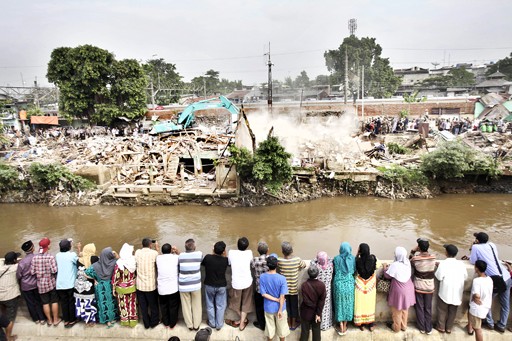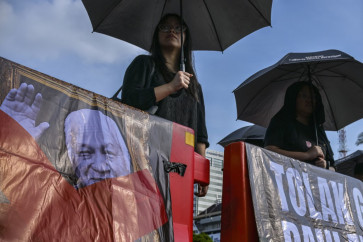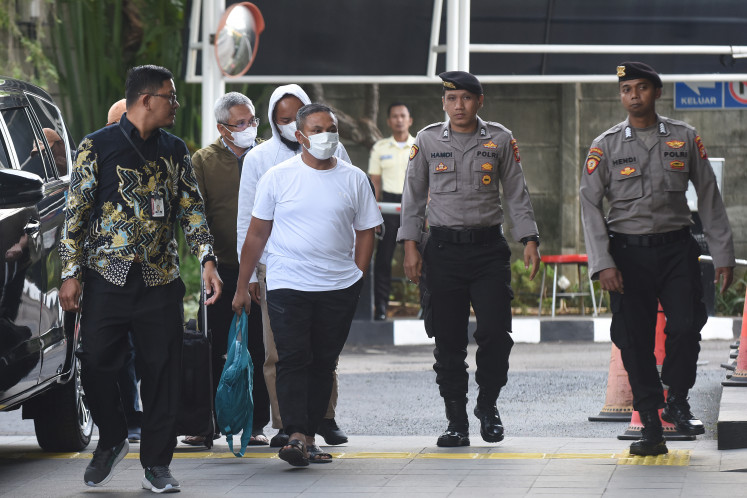Popular Reads
Top Results
Can't find what you're looking for?
View all search resultsPopular Reads
Top Results
Can't find what you're looking for?
View all search resultsAhok sticks to his guns
Change text size
Gift Premium Articles
to Anyone
 Nothing left: People watch the demolition of houses on the banks of Ciliwung River in Bukit Duri, South Jakarta, on Wednesday. The evictions in Bukit Duri will make way for the Jakarta administration to continue flood mitigation efforts. The residents will be relocated to several low-cost apartments in Jakarta. (JP/Dhoni Setiawan)
Nothing left: People watch the demolition of houses on the banks of Ciliwung River in Bukit Duri, South Jakarta, on Wednesday. The evictions in Bukit Duri will make way for the Jakarta administration to continue flood mitigation efforts. The residents will be relocated to several low-cost apartments in Jakarta. (JP/Dhoni Setiawan)
I
n a move that has drawn both praise and sharp criticism, Jakarta Governor Basuki “Ahok” Tjahaja Purnama on Wednesday carried out his controversial plan to evict the people living on the banks of the Ciliwung River in Bukit Duri, South Jakarta.
Critics, including one of his rivals in the gubernatorial race, have accused the governor of ignoring the human aspects of urban development and departing from the policy of his predecessor, Joko “Jokowi” Widodo, who won the hearts of many Jakartans in 2012 for his ability to engage residents in dialogue and refrained from carrying out forced evictions.
But the governor, who seeks to extend his term through the 2017 election, insisted the evictions had to go on and could not be postponed.
“The Ciliwung River restoration program is a project under the Public Works and Public Housing Ministry. It uses the 2016 state budget for the project. So the normalization has to start immediately,” he said.
The remaining residents, showing no violent resistance, could only protect themselves with face masks as a green backhoe moved relentlessly from one house to another to complete the demolitions, which has been the city’s plan since 2014.
The evictions were carried out to pave way for the river’s “normalization” program, as the city considered that the residents were occupying state land and the houses were among the main causes of severe floods.
The residents dismissed the city’s rationale, saying that they had solid evidence to prove their ownership of the land, which included girik (customary land appointments) and Eigendom Verponding, a proof of property ownership issued by the Dutch administration before the nation’s independence.
This was not the first clearance carried out under Ahok’s administration. In 2015, the governor forcefully evicted residents of the flood-prone Kampung Pulo in East Jakarta, which led to a violent clash between city officials and the defiant residents.
Ahok said he did not care about the impact of his policy on his electability, saying that what mattered was that he could leave a legacy that people would remember.
“If I don’t get elected, people will know that I am the person who addressed the problems of Kampung Pulo and Bukit Duri,” he said.
However, many consider that Ahok had no choice but to press ahead with his eviction plan, as he would lose face if he decided to back out.
“[He] shows firmness and consistency by going ahead with the evictions despite the election. That makes his voters more confident with their choice,” said University of Pelita Harapan political analyst Emrus Sihombing.
Bukit Duri was initially occupied by 379 families, who claimed 460 plots of land on the riverbank, before the eviction plan was resurrected two years ago. Three hundred and thirteen families relented in their resistance and decided to move to a low-cost rental apartment in Rawa Bebek in East Jakarta, while the rest refused the offer to be relocated. They declined to move as they would only get an apartment free of charge for the first three months and afterwards would have to pay a rental fee of Rp 300,000 (US$23.15) per month.
The residents’ advocate, Sandyawan Sumardi, said that of the 66 families, 20 had moved to a rented communal house at Poncol in Senen, Central Jakarta, while the other 46 families were renting houses in other areas, including in Bukit Duri and Kebon Pala, East Jakarta.
“We moved to Poncol because it is near the Central Jakarta District Court. We are going to fight for our rights in the court,” Sandyawan said, referring to their legal effort to challenge the city’s policy.
One of Ahok’s rivals, Anies Baswedan, criticized the governor for failing to listen to the people’s demands. “We don’t only manage a city, but also its people. People’s aspirations must be heard,” he said as quoted by Antara news agency on Wednesday.
Citra Referendum, a public attorney with LBH Jakarta, said the evictions in Bukit Duri were not carried out in line with the International Covenant on Economic, Social and Cultural Rights, as the administration had never engaged in discussions with residents regarding the plan.
Ahok had departed from Jokowi’s policy concerning the matter, which was to move the Bukit Duri residents to a kampung deret (elevated village) near the area to pave the way for the river’s restoration. Residents said that they remembered Jokowi had promised he would not evict them and he would build humane housing for them. (adt)
________________________________________
To receive comprehensive and earlier access to The Jakarta Post print edition, please subscribe to our epaper through iOS' iTunes, Android's Google Play, Blackberry World or Microsoft's Windows Store. Subscription includes free daily editions of The Nation, The Star Malaysia, the Philippine Daily Inquirer and Asia News.
For print subscription, please contact our call center at (+6221) 5360014 or subscription@thejakartapost.com









